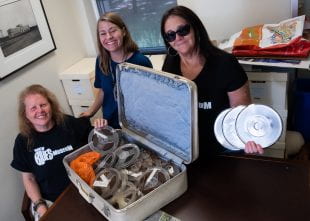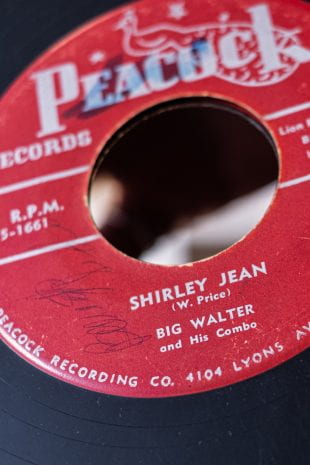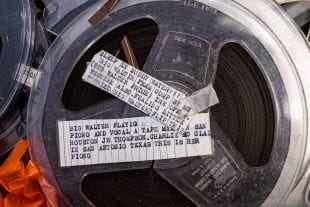The Woodson Research Center in Rice University’s Fondren Library is now the custodian of yet another portal into Houston’s musical past: the archives of the Houston Blues Museum, which span more than seven decades and include the personal and professional effects of some of the city’s most legendary blues musicians.

Jomonica Phoenix, Norie Guthrie and Sandy Hickey with the first of many Houston Blues Museum donations at the Woodson Center July 19. (Photos by Jeff Fitlow)
Norie Guthrie, an archivist and special collections librarian, has managed the Woodson’s popular Houston Folk Music Archive since its inception in 2016. And when Guthrie heard through local music circles that the Houston Blues Museum — a mobile museum since its own creation in 2010 — was struggling to find a location in which to store its sensitive archives, she offered Fondren Library’s resources as a solution.
“My reaction was like, ‘Oh my god, am I dreaming?’” said Sandy Hickey, who co-founded the museum along with longtime friend and blues supporter Jomonica Phoenix. “This is what we’ve been looking for forever.”
One of the biggest pieces in the collection was acquired in 2007, when Hickey — a blues singer herself who once owned Mickey’s Mardi Gras and Silky’s Blues Bar —bought the enormous metal sign that once hung outside Billy Blues. Once the city’s premier blues venue, the Richmond Strip mainstay closed in 2001; Hickey heard a private collector owned the sign, so she snapped it up around the same time she was stepping down as president of the Houston Blues Society.
“I don’t know what I was thinking,” laughed Hickey, who quickly realized she couldn’t even get the sign through the front door of her house. And so, she decided: “I guess I need to start a museum to put it in.”
Three years later, the Houston Blues Museum was formed. Though the collection briefly had a physical location in the Fifth Ward, the original building’s structural issues forced the museum to hit the road again. All the while, Hickey and Phoenix continued collecting, preserving the memories of musicians they’d come to love like family.
“I’ve been very fortunate in that I’ve had long-term relationships with these musicians and their families — and Jomonica has as well — and they’ve been generous to us,” Hickey said. “So we have quite a lot of things.”
Donations over the last decade have included everything from Marie English’s keyboard and Kinney Abair’s guitar and amp to suitcases of clothes that once belonged to Jimmy “T99” Nelson. Among the more colorful items in the collection are much of Texas Johnny Brown’s wardrobe, from his hats to his shoes to a lime green leisure suit and a red kimono.

The famous Peacock Records label was started in Houston in 1949 by Don Robey and featured many prominent blues acts.
June 19 marked the first delivery of Houston Blues Museum materials to the Woodson, consisting mostly of collections related to Big Walter “The Thunderbird” Price, the elder statesman of Houston blues, who died in 2012. Much of it was salvaged from a storage locker, which Hickey and Phoenix saved from auction with only a day to spare.
Inside Price’s boxes and suitcases were priceless treasures: original recordings, metal molds used to cast vinyl records, contracts from Sunshine and Peacock Records, glittering cuff links and vellum-thin receipts of weekly $6 rent paid to a boarding house in 1946. All of this, said Hickey and Phoenix, was “just a drop in the bucket” compared to what they still have to bring over to Rice.
“Now it’s going to get preserved and it’s going to be exposed to where people can see what we have,” Hickey said.
But first, there’s cataloging and archiving to be done — and there are still boxes and boxes of material to bring to the Woodson Center.
“We’ll quickly get those processed and available to researchers,” said Guthrie, for whom this new addition means even more opportunity to document and record Houston’s music history. “Our next plan is to seek out new collections in an effort to preserve the history of the blues scene.”


